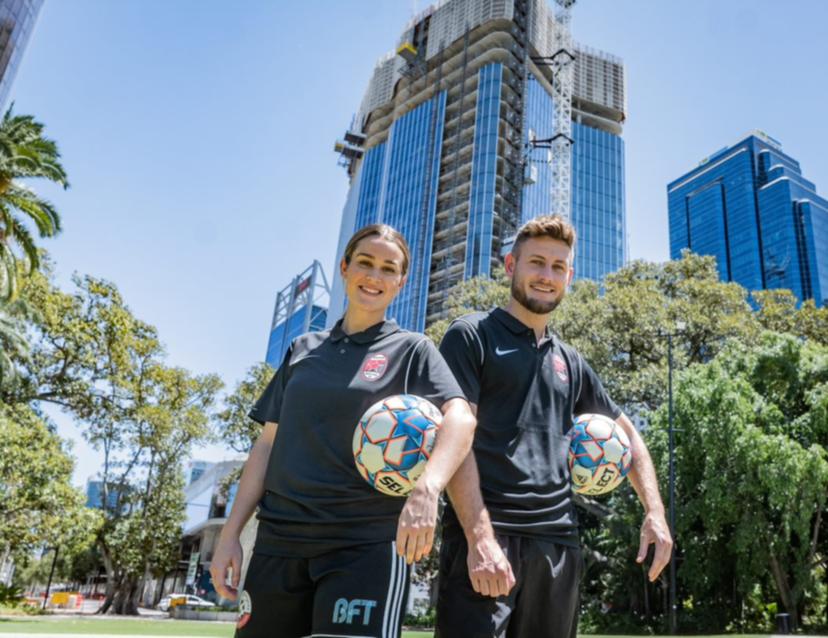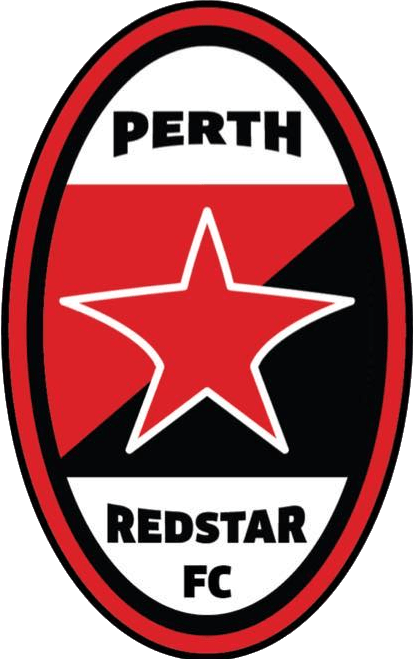

Last Thursday at a media event in Perth, a new NPL club was officially launched.
Perth RedStar FC has been formed following the merger of ECU Joondalup and Northern Redbacks Women’s Soccer Club, two of the most successful development clubs in WA.
Speaking to PerthNow, Perth RedStar FC General Manager Simon Hicks said the merger heralded a new era not just for two longstanding clubs, but also for the future of soccer in Perth, and the new club wanted to preserve the proud tradition of both clubs in developing elite-level footballers.
“We’ve got numerous A License and B License coaches involved with the club. The coaching staff would rival that of any state level club in the country,” he said.
“In terms of being a development club, we want to be developing five professional players a year, because that’s essentially what comes out of the State and we want to be dominating player development on the women’s side and the men’s side.”

ECU Joondalup currently plays in the NPL and have long been recognised as a powerhouse of Western Australian men’s football, when it comes to developing players who go on to play in the A-League and for Australia. The current coach is ex-Perth Glory coach Kenny Lowe, and previous players include Socceroos Adam Taggart, Josh Risdon, Brad Jones, Rhys Williams, Shane Lowry and Chris Herd, as well as Perth Glory players past and present Alex Grant and Brandon O’Neill.
Northern Redbacks are the sole female-only club in WA, and their impressive record over the years in terms of title successes and player development is second to none. The club has won 15 league titles and nine State cups since its formation in 1991, and players such as Lisa De Vanna, Collette Gardiner (née McCallum), Kim Carroll, Demi Vance and Nadene Caldwell (the latter two are current Northern Ireland internationals) have all played for the club. The 2022 squad boasts five current and past Perth Glory players plus an ex-NZ international. The club also regularly supplies junior players to the NTC program and five players from last season were selected for 2022 NTC scholarships.
From the perspective of the women’s game in WA, the merger may seem a strange one given the success of Northern Redbacks over the years, and club president Tony Mullen provided some insight into the thinking behind the decision.
“The merger became necessary primarily because Northern Redbacks don’t have a venue that meets the criteria for participating in the NPLW, and the club was advised by Football West that it would no longer be able to participate in the NPLW without meeting those criteria,” he said.
“In recent years we approached a number of clubs and city councils to share or develop facilities fit for playing at NPLW level, but as a female-only club, we did not have the power to convince those clubs or councils of the merits of our long-term proposals.”


As well as the lack of a suitable venue, the club was also finding it hard to source the financial funds needed to help cover the costs associated with playing in the NPLW, despite recently attracting the sponsorship of multi-national mining company EPIROC. Club founder Tim Hodgson had this to say about what the future was looking like without the merger.
“To be honest our future was not assured. It’s a very tough job being a women’s only club, resources are limited or non-existent and having access to adequate facilities has been virtually impossible,” he said.
The merger with ECU Joondalup now provides certainty with regard to a venue and also opens up more opportunities to attract sponsorship deals, but in the eyes of Hodgson there are other exciting possibilities that will arise from the joining of forces.
“If you sat down and wrote a list of what would be required to create the ideal environment for female players I think it would be exactly what this merger will bring.”
President Tony Mullen agreed that there was more to the merger than a venue and financial security.
“There is so much potential from two clubs with a vision for developing young talent merging. Most semi-professional Australian clubs set fees which are a barrier to many talented players and their families. Perth RedStar has set a fee cap. This will help attract girls and boys who will play and train under accredited coaches, who have access to resources and the latest sports science. This will create a conveyor belt of players coming through the ranks, some of whom will go on to successful playing careers. The club will also support female players to become accredited coaches, some of whom may also go on to pursue successful international careers such as Tanya Oxtoby and Nicola Williams.”
One aspect of the merger that catches the eye is the proposal of a new purpose-built venue in Perth’s northern corridor, which would be similar to the State Football Centre in Queens Park, and this was mentioned by Hicks on the day of the launch.
“Facilities are pretty stretched up in the northern suburbs. We definitely will be fighting to improve that over the next however many years and one of the main items for us is getting that venue and facilities sorted,” he said.
“More than likely that would not be partnered with the university — but I’m not ruling anything out.”


The choice of name and logo has generated some discussion in the football community, with some suggesting that the RedStar name is linked with the Serbian community, but as Mullen explains there is no intent to associate the new club with the likes of Red Star Belgrade.
“The inspiration behind the name Perth RedStar has much to do with the ambition behind the formation of this progressive club. Association Football is a world sport. The first Red Star football club was founded in Paris in 1897 by a visionary named Jules Rimet who went on to serve as president of both the French Football Federation and FIFA.”
Hicks also explained the thinking behind the choice of name.
“We wanted the name to make a statement and be different. RedStar is more a statement than anything else; some people will like it, some people won’t.”
With the merger effectively ending the Northern Redbacks as the sole competitive female-only club in WA, Mullen and Hodgson were asked if they felt there was a danger that the rich history of the club would now be forgotten.
“There will be people involved in the new entity that will ensure that the Redbacks’ history will be recognised and acknowledged. When the facilities are developed both clubs’ history will be recognised in the clubhouse. It is now up to Perth RedStar FC to enhance the Redbacks’ history and success and contribute to making their own history,” Hodgson said.
“The Northern Redbacks will always have a legacy in WA football and we’re planning events for this season and during the FIFA Women’s World Cup in 2023 to celebrate the achievements of the Redbacks and their contribution to the development of women’s football in WA,” added Mullen.
This merger is the latest in a recent series that has seen Perth clubs pool their resources, with Carramar Shamrock Rovers, Kingsley Westside and Murdoch University Melville all becoming large forces in the game over the last five years. For some they represent big clubs getting bigger, but Football West is comfortable with these mergers and a spokesperson said:
“Football West supports all clubs in becoming more inclusive and representing all parts of the community. Merging of clubs can reduce the load on volunteers, improve accessibility to facilities and provide a pathway for all members of the club to play, coach and volunteer at the level they desire.”
The current pre-season night series for men and women will see ECU Joondalup and Northern Redbacks continue to play in their original names and colours before Perth RedStar FC commence in the respective league campaigns in March and April.






